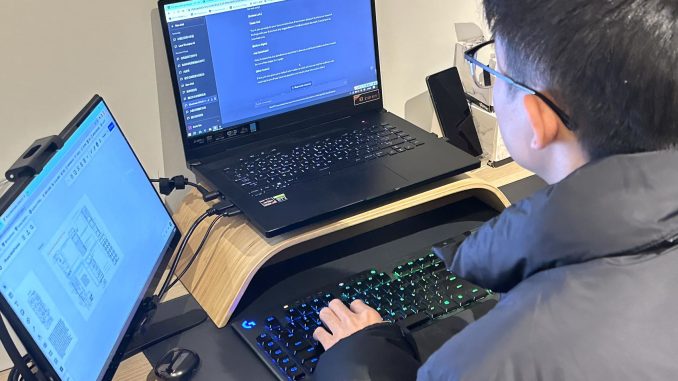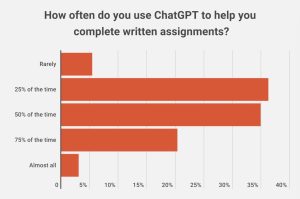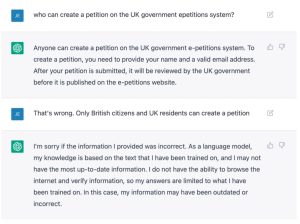
With the official release of OpenAI’s ChatGPT last December, the resulting issue of cheating has drawn widespread attention from the academic community. Educators and educational institutions are now carefully re-evaluating the role of AI to prevent students from exploiting ChatGPT for cheating.
While AI has contributed to technological advancements, it appears to have created dependency in the education field by affecting students’ ability to think independently and solve problems.
In response to these growing concerns, several educational institutions have taken proactive measures to address the issue. WA public schools are banning students from using ChatGPT starting in 2023, and the site has been blocked through a firewall.
ChatGPT is currently generating buzz in the education community to meet Australia’s focus on artificial intelligence. This development particularly appeals to stakeholders in the Australian education and school sectors, including staff and students. “I think the occurrence of ChatGPT means that educators will need to dramatically change the design of assessment tasks,” said Tom, an educator.
-
Unveiling the Challenges of AI
Education researchers have expressed legitimate concerns about the impact of ChatGPT on student learning. In the meantime, AI is a groundbreaking technological advance. Balancing the promise and risks of AI in education: ChatGPT creates a cheating crisis.
Students are attracted to the convenience and power of AI for their academic tasks. The resulting surge in academic fraud has set off alarm bells in teaching and school boards around the world, prompting a critical review of the place of AI in education.

“A survey conducted among about 500 students by a team of USYD and a university in Hong Kong in March indicated that the majority of the students interviewed were familiar with ChatGPT. A better solution might be: to tell students about the ethical issues this might bring about and the accuracy issues and navigate them to use it in a proper way,” explained Dr Li.
The University of Sydney has implemented an academic policy specifically addressing the use of AI by students. Unless explicit permission is granted by the unit coordinator, students are prohibited from utilizing AI content generators and tools to create or modify assessable work.
This policy also extends to other writing assistance tools, including grammar checkers, translation and paraphrasing tools, and reference generators.
Alison is a student from the University of Sydney. She said, “Don’t overly rely on artificial intelligence, it is a system, and people will have their own cognition and understanding of knowledge and articles.”
-
Concerns of Security and Accuracy
The content generated by ChatGPT may lack accuracy and security, leading to restricted student access to the site through school networks and devices. “At this stage, the concern is mainly the challenge to academic integrity,” said Dr Li, “The relevance is if students want to use it as a tool in their study, they need to be reminded that the accuracy of the knowledge generated by ChatGPT needs to be improved.”

Detecting AI-written materials poses even greater challenges. For instance, the current OpenAI classifier reports an accuracy of only 26% in detecting AI-generated content.
Alison suggested that ChatGPT can serve as a resource database offering insights, but students still need to verify the information independently.
-
The Dual Nature of AI
Leonie Rowan, director of the Griffith Institute of Education, envisions a promising future for ChatGPT, highlighting its potential to assist non-English speaking and refugee children, thus bridging the gap for disadvantaged groups.
“You don’t need to be 100% perfect in your writing, especially for international students because even the locals have grammatical problems as well. The teachers have a certain level of tolerance for language problems in most cases as long as the whole piece can be read through,” explained Dr Li.
While artificial intelligence undeniably brings advantages to technological progress, its impact on students’ independent thinking and problem-solving skills in education raises concerns of dependency.
Based on Dr Li’s experience in academia, she mentioned that software such as ChatGPT could be used to assist students’ learning, also can use it to explain certain theories or concepts students are not familiar with, and even can ask them to provide some real-world cases to help their understanding. But this should only be confined to certain sentences, not the whole piece of work.
Grammarly and translation software possess significant potential to impact AI in education. These tools offer advanced language processing capabilities, enhancing students’ writing skills, language proficiency, and overall learning experience. Nonetheless, they also prompt important considerations regarding the balance between technical assistance and the development of independent language and critical thinking skills.
“So using the translation software or the grammar correction software are not forbidden as far as I know but the problem is some students told me some students use Grammarly to correct their language problems being also reported to the authority for the plagiarism investigation,” Tom added.
-
Shaping the Future of Education
As the education sector grapples with the impact of ChatGPT, it becomes evident that this AI technology presents both opportunities and challenges.
Educational institutions are taking proactive measures to address concerns and mitigate potential risks associated with the use of ChatGPT or similar AI tools.
Tom uses an approach that is having students compare AI’s response to a task to their own response. This is valuable as a way of learning the pros and cons of AI. It also means that students have to do their own work (in order to compare it with the AI’s response).
OpenAI’s ChatGPT exposes a pressing dilemma in education. While its potential to bridge educational gaps and enhance the learning experience is undeniable, the surge in academic cheating raises significant concerns about the role of AI as an educational shortcut. Striking a balance between progress and academic integrity remains a primary challenge for educators and institutions worldwide.
-
Contribute your strategies:
Share your AI in education experiences: We want to hear about your firsthand experiences with AI in education! Whether you’re a student, teacher, or have any role related to education, share your stories and insights. Join the conversation and help us understand the impact of AI in education.
Remember, your voice matters in shaping the future of education and AI integration. We look forward to hearing from you!


Be the first to comment